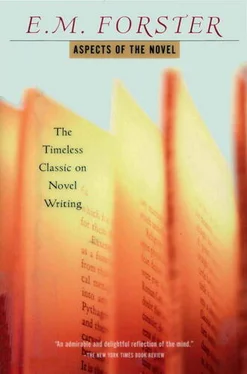Thus speaks the heroine, in accents which certainly chill the reader. Yet we want to know what happens next. The rocks are of cardboard, like those in my dear Swiss Family; the tempest is turned on with one hand while Scott scribbles away about Early Christians with the other; there is no sincerity, no sense of danger in the whole affair; it is all passionless, perfunctory, yet we do just want to know what happens next.
Why—Lovel rescues them. Yes; we ought to have thought of that; and what then?
Another ragged end. Lovel is put by the Antiquary to sleep in a haunted room, where he has a dream or vision of his host's ancestor, who says to him, "Kunst macht Gunst" words which he does not understand at the time, owing to his ignorance of German, and learns afterwards that they mean "Skill wins Favour": he must, pursue the siege of Isabella's heait. That is to say the supernatural contributes nothing to the story. It is introduced with tapestries and storms, but only a copybook maxim results. The reader does not know this though. When he hears "Kunst macht Gunst" his attention reawakens— then his attention is diverted to something else, and the time-sequence goes on.
Picnic in the ruins of St. Ruth. Introduction of Dousterswivel, a wicked foreigner, who has involved Sir Arthur in mining schemes and whose superstitions are ridiculed because not of the genuine Border band. Arrival of Hector Mclntyre, the Antiquary's nephew, who suspects Lovel of being an impostor. The two fight a duel; Lovel, thinking he has killed his opponent, flies with Edie Ochiltree, who has turned up as usual. They hide in the ruins of St. Ruth, where they watch Dousterswivel gulling Sir Arthur in a treasure-hunt. Lovel gets away on a boat and—out of sight out of mind; we do not worry about him until he turns up again. Second treasure-hunt at St. Ruth. Sir Arthur finds a hoard of silver. Third treasure-hunt. Dousterswivel is soundly cudgelled, and when he comes to himself sees the funeral rites of the old Countess of Glenallan, who is being buried there at midnight and with secrecy, that family being of the Romish persuasion.
Now the Glenallans are very important in the story, yet how casually they are introduced! They are hooked on to Dousterswivel in the most artless way. His pair of eyes happened to be handy, so Scott had a peep through them. And the reader by now is getting so docile under the succession of episodes that he just gapes, like a primitive cave-man. Now the Glenallan interest gets to work, the ruins of St. Ruth are switched off, and we enter what may be called the "pre-story," where two new characters intervene, and talk wildly and darkly about a sinful past. Their names are: Elspeth Mucklebackit, a Sibyl of a fisherwoman, and Lord Glenallan, son of the dead countess. Their dialogue is interrupted by other events—by the arrest, trial and release of Edie Ochiltree, by the death by drowning of another new character, and by the humours of Hector Mclntyre's convalescence at his uncle's house. But the gist is that Lord Glenallan many years ago had married a lady called Evelina Nevile, against his mother's wish, and had then been given to understand that she was his half-sister. Maddened with horror, he had left her before she gave birth to a child. Elspeth, formerly his mother's servant, now explains to him that Evelina was no relation to him, that she died in childbirth—Elspeth and another woman attending— and that the child disappeared. Lord Glenallan then goes to consult the Antiquary, who, as a Justice of the Peace, knew something of the events of the time, and who had also loved Evelina. And what happens next? Sir Arthur Wardour's goods are sold up, for Dousterswivel has ruined him. And then? The French are reported to be landing. And then? Lovel rides into the district leading the British troops. He calls himself "Major Nevile" now. But even "Major Nevile" is not his right name, for he is who but the lost child of Lord Glenallan, he is none other than the legitimate heir to an earldom. Partly through Elspeth Mucklebackit, partly through her fellow servant whom he meets as a nun abroad, pardy through an uncle who has died, partly through Edie Ochiltree, the truth has come out. There are indeed plenty of reasons for the dénouement, but Scott is not interested in reasons; he dumps them down without bothering to elucidate them; to make one thing happen after another is his only serious aim. And then? Isabella Wardour relents and marries the hero. And then? That is the end of the story. We must not ask "And then?" too often. If the time-sequence is pursued one second too far it leads us into quite another country.
The Antiquary is a book in which the life in time is celebrated instinctively by the novelist, and this must lead to slackening of emotion and shallowness of judgment, and in particular to that idiotic use of marriage as a finale. Time can be celebrated consciously also, and we shall find an example of this in a very different sort of book, a memorable book: Arnold Bennett's The Old Wives' Tale. Time is the real hero of The Old Wives' Tale. He is installed as the lord of creation—excepting indeed of Mr. Critchlow, whose bizarre exemption only gives added force. Sophia and Constance are the children of Time from the instant we see them romping with their mother's dresses; they are doomed to decay with a completeness that is very rare in literature. They are girls, Sophia runs away and marries, the mother dies, Constance marries, her husband dies, Sophia's husband dies, Sophia dies, Constance dies, their old rheumatic dog lumbers up to see whether anything remains in the saucer. Our daily life in time is exactly this business of getting old which clogs the arteries of Sophia and Constance, and the story that is a story and sounded so healthy and stood no nonsense cannot sincerely lead to any conclusion but the grave. It is an unsatisfactory conclusion. Of course we grow old. But a great book must rest on something more than an "of course," and The Old Wives' Tale is very strong, sincere and sad—it misses greatness.
What about War and Peace ? That is certainly great, that likewise emphasizes the effects of time and the waxing and waning of a generation. Tolstoy, like Bennett, has the courage to show us people getting old—the partial decay of Nicolay and Natasha is really more sinister than the complete decay of Constance and Sophia: more of our own youth seems to have perished in it. Then why is War and Peace not depressing? Probably because it has extended over space as well as over time, and the sense of space until it terrifies us is exhilarating, and leaves behind it an effect like music. After one has read War and Peace for a bit, great chords begin to sound, and we cannot say exactly what struck them. They do not arise from the story, though Tolstoy is quite as interested in what comes next as Scott, and quite as sincere as Bennett. They do not come from the episodes nor yet from the characters. They come from the immense area of Russia, over which episodes and characters have been scattered, from the sum-total of bridges and frozen rivers, forests, roads, gardens, fields, which accumulate grandeur and sonority after we have passed them. Many novelists have the feeling for place—Five Towns, Auld Reekie, and so on. Very few have the sense of space, and the possession of it ranks high in Tolstoy's divine equipment. Space is the lord of War and Peace, not time.
A word in conclusion about the story as the repository of a voice. It is the aspect of the novelist's work which asks to be read out loud, which appeals not to the eye, like most prose, but to the ear; having indeed this much in common with oratory. It does not offer melody or cadence. For these, strange as it may seem, the eye is sufficient; the eye, backed by a mind that transmutes, can easily gather up the sounds of a paragraph or dialogue when they have aesthetic value, and refer them to our enjoyment—yes, can even telescope them up so that we get them quicker than we should do if they were recited, just as some people can look through a musical score quicker than it can be rapped out on the piano. But the eye is not equally quick at catching a voice. That opening sentence of The Antiquary has no beauty of sound, yet we should lose something if it was not read aloud. Our mind would commune with Walter Scott's silendy, and less profitably. The story, besides saying one thing after another, adds something because of its connection with a voice.
Читать дальше












